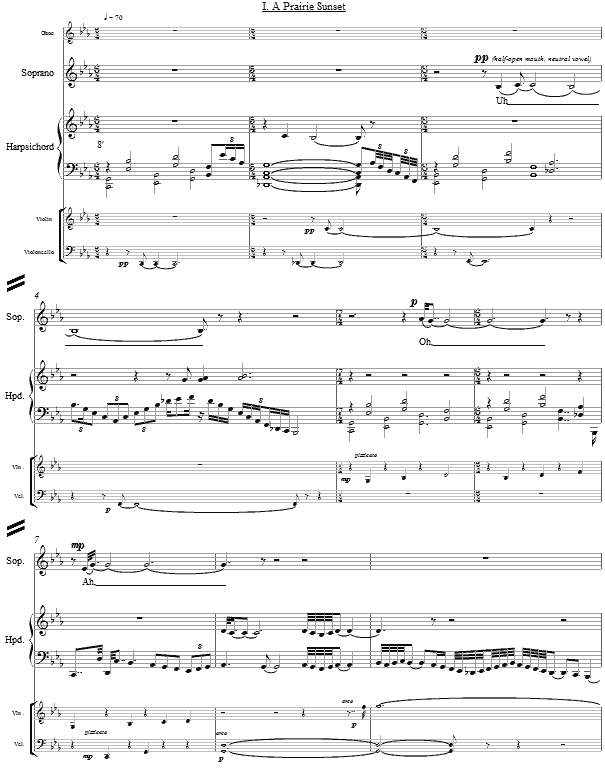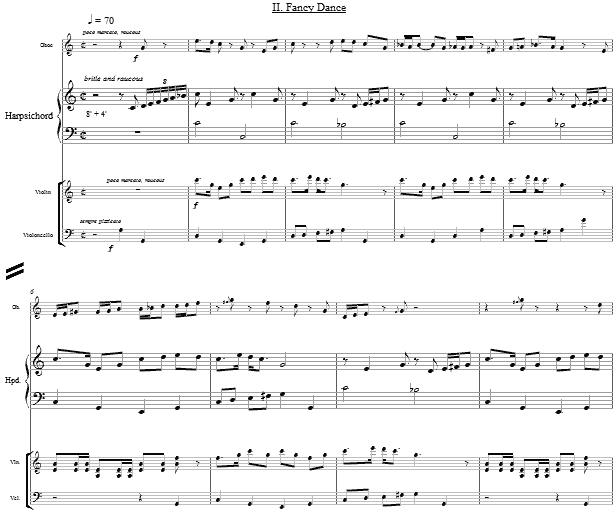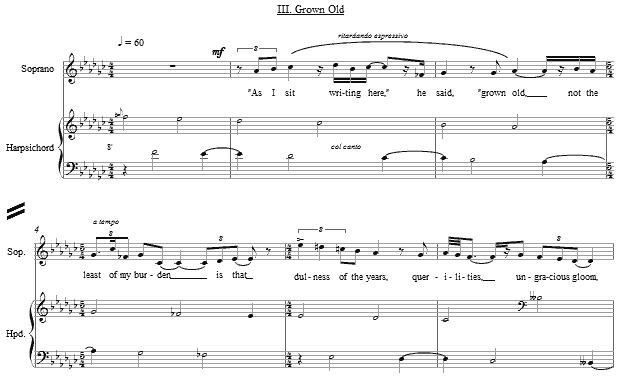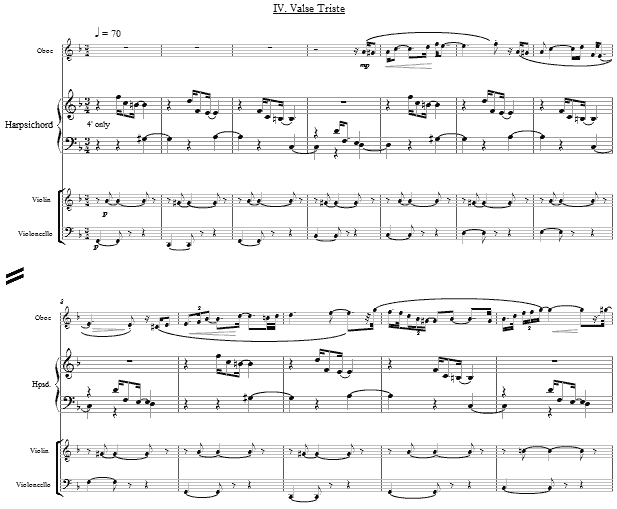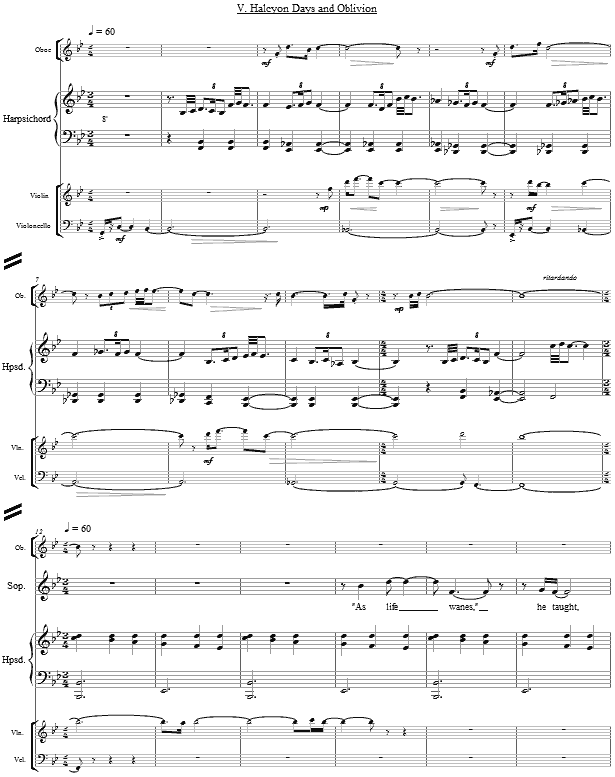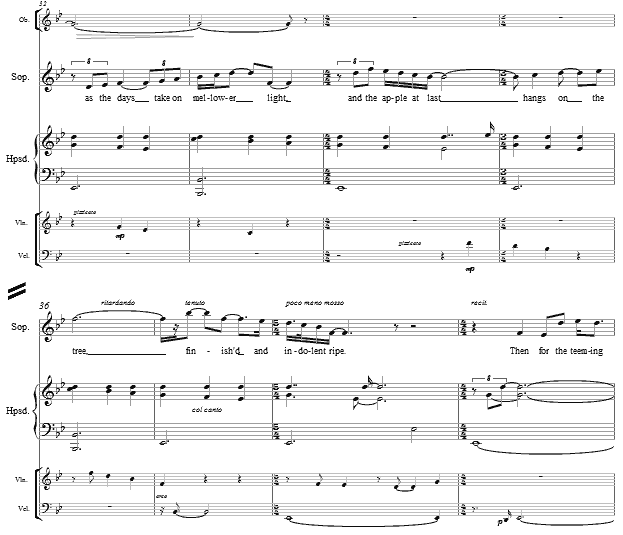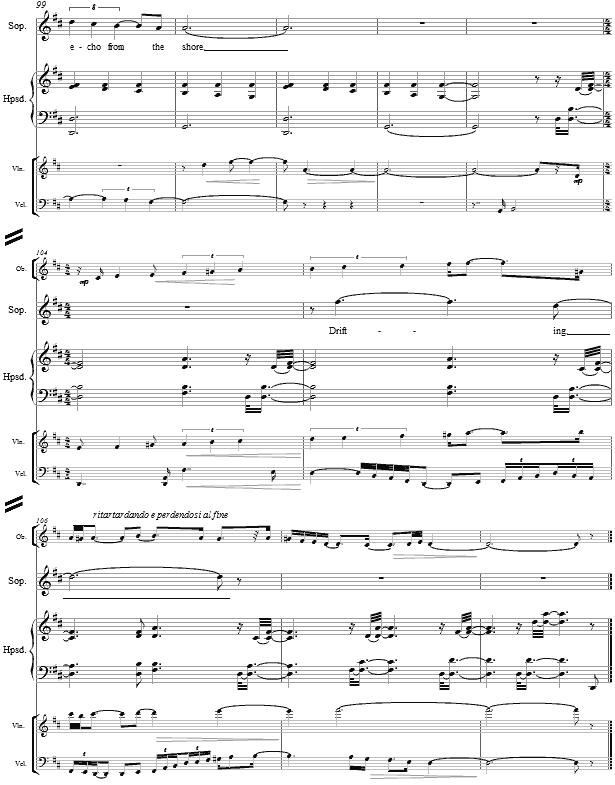Music and Texts of GARY BACHLUND Vocal Music | Piano | Organ | Chamber Music | Orchestral | Articles and Commentary | Poems and Stories | Miscellany | FAQs |
An Echo from the Shore - (2002)
Text adapted from the Late Works of Walt Whitman
for soprano, oboe, violin, violoncello and harpsichordCommissioned by Ursula Krummel for Pacific Serenades
i. Prairie Sunset [ 8 pages, circa 6' 00" ]
Shot gold, maroon and violet, dazzling silver, emerald, fawn,
the earth's whole amplitude and Nature's multiform power
consign'd for once to colors;
The light, the general air possess'd by them -
colors till now unknown,
no limit, confine - not the Western sky alone -
the high meridian - North, South, all,
pure luminous color fighting the silent shadows to the last.
"In the free ev'ning of my day," he said, "I give you talk, thoughts,
reminiscences, as idly drifting down the ebb,
such ripples, half-caught voices, echo from the shore."
How sweet the silent backward tracings!
The wand'rings as in dreams - the meditation of old times
resumed - their loves, joys, persons, voyages.
How sweet.
ii. Fancy Dance (instrumental only) [ 2 pages, circa 40" ]
iii. Grown Old - "Querilities" [ 8 pages, circa 5' 15" ]
"As I sit writing here," he said, "grown old,
not the least of my burden is that dulness of the years, querilities,
ungracious gloom, aches, may filter in my daily songs."
"Approaching, nearing, curious," he wrote,
"Thou dim, uncertain spectre - bringest thou life or death?
Strength or weakness, blindness or placid skies and sun?
Wilt stir the waters yet?
Or haply cut me short for good?
Bringest thou life or death?"
The two old, simple problems ever intertwined,
close home, elusive, present,
by each successive age insoluble, pass'd on,
to ours to-day - and we pass on the same.
Have we learn'd lessons only of those who admired us, and
were tender with us, and stood aside for us?
Have we not learn'd the great lessons from those
who reject us, or who treat us with contempt?
Ever the undiscouraged, resolute, struggling soul of man;
Ever the eager eyes, hurrahs, the welcome-clapping hand;
curious, unconvinced at last;
struggling to-day the same.
iv. Valse Triste (instrumental only) [ 1 pages, circa 55" ]
v. Halcyon Days and Oblivion [ 9 pages, circa 7' 20" ]
"As life wanes," he taught, "and all the turbulent passions calm,
as gorgeous vapory, silent hues cover the evening sky,
as softness, fulness, rest, suffuse the frame, like fresher, balmier air,
as the days take on a mellower light, and the apple at last hangs
on the tree, finish'd and indolent-ripe.
Then for the teeming quietest, happiest days of all!
The brooding and blissful halcyon days!"
After the dazzle of day is gone,
only the dark, dark night shows to my eyes the stars;
silent, athwart my soul, moves the symphony true.
The soft voluptuous opiate shades,
the sun just gone, the eager light dispell'd -
(I too will soon be gone, dispell'd,)
a haze - nirwana - rest and night - oblivion,
as life wanes, idly drifting down the ebb,
such ripples, half-caught voices, echo from the shore.
Total score [ 31 pages with cover, contents and libretto, circa 20' 05" ]
Walt Whitman
The libretto is compiled by the composer from the late works of Walt Whitman, with the poet's particular spelling choices unaltered in deference to his art, craft and time.
The work was commissioned for Pacific Serenades by Ursula Krummel [ 1 ] through the recommendation of Mark Carlson, and debuted in three performances during April of 2003 by Juliana Gondek, soprano, Allan Vogel, oboe, Clayton Halsop, violin, David Speltz, violoncello and Patricia Mabee, harpsichord.
The harpsichord required for the work is a full keyboard, with a minimum of both 8 and 4 foot stops. The full score doubles as both the vocal and keyboard scores (a page turner is recommended), and three additional parts for oboe, violin and violoncello come together in the publication of the work. The vocal part ranges from low A to high B-flat, much the same tessitura as Strauss' Ariadne auf Naxos, which was the suggestion of Juliana in our conversations before composing the work.
The first gestures in the harpsichord are meant to suggest a somewhat desolate moment, as the author -- Whitman -- indulges in self-reflection on the end of his life, at the end of his life. The voice enters quietly as part of the chamber ensemble texture, without text until the first entrance of the Whitman text itself after a meditative introduction. A broad melodic line for the soprano rises to successive climaxes with the many colors by which Whitman paints the "Prairie Sunset," and the movements ends quietly.
The full score shows the oboe, violin and violoncello parts in smaller print, so as to make the vocal line and harpsichord more easily used as a "vocal" edition.
Demo excerpt - MP3 file [ 2.38 MB, 2' 33" ]
A vey short and raucous instrumental interlude dotted with some musical reminiscences of an Americana flavor follows, reflecting another side to life, that earlier and more vibrant suggestion of youth.
As answer to this moment of musical ribaldry, the second block of text begins with soprano and harpsichord alone. A set of sparse, time shifted, falling octaves underpins a set speech-pattern melodic phrases for the soprano, after which the violin and violoncello enter quietly to join in an A-B-A-B form.
Another instrumental interlude intervenes, this a sad waltz which is subtitled "Querilities." This is a reflection on Whitman's concern that "dulness of the years, querilities, ungracious gloom, aches, may filter in my daily songs." Such is this minute long, awkward-lined meditation for oboe and the accompaniment of the remaining ensemble.
The final movement begins with a quote from an old American gospel song, Blessed Assurance" mingled with snippets predicting what will be the gestures of the lyrical vocal line. Thereafter the text begins over an utterly simple and repetitive two-measure phrase rocking child-like between tonic and subdominant.
The soprano line rises to its lyric height at measure 37 with the notion that the "apple" as metaphor for life is "finished." The singer is encouraged to take time to make poignant this gesture as it captures the sense of the text.
At the close of this moment and the work as a whole, the text which gives the piece its title appears, as if a summation. The simple, central theme of this extended 3/4 movement yields to a final appassionato as for a second time in the movement the oboe and strings sing out large arching phrases as the soprano sings Whitman's notion of "drifting" at life's end.
The score for An Echo from the Shore as well as parts and some remarks for program notes are available as a free PDF download, though any major commercial performance or recording of the work is prohibited without prior arrangement with the composer. Click on the graphic below for this chamber music score and parts.
Oboe part
Violin part
Violoncello part
Another text of Whitman's, To the States, is set for soprano or tenor and piano. For the founder of Pacific Serenades, Mark Carlson, I penned a short Sonatina for Flute and Harp in F major, the score to which is available as a free download.
NOTES
[ 1 ] From an article entitled "Board Member Spotlight," by Laura Kaufman, in an untitled Pacific Serenades publication, April 2003.
"When Ursula Krummel attended her first Pacific Serenades concert she felt transported back to her childhood in post-World War II Germany.
Family and friends would come over, she recalled, and serenade themselves on Sunday afternoons. The music was classical, mostly, except when an uncle would improvise a Souza march on the door of the family's flat.
"Pacific Serenades Saturday night concerts share an intimate connection with the Hausmusik (house music) performances Ursula remembers with fondness. "The closeness of the performers, it's like a family atmosphere," said Ursula, a Board member for the past seven years and a retired aerospace lab supervisor at Bendix.
"Ursula attended her first Pacific Serenades concert a decade back and was immediately hooked. She joined the Board not long after and has since enjoyed baking goodies and planning food for the Saturday night events, as well as manning the CD table at the Sunday Neighborhood Church venue. Making others feel comfortable comes naturally to Ursula, who now works as a New Zealand Airlines VIP Lounge hostess at LAX, where she have served opera star Kiri te Kanawa and the pop legend Elton John.
"Ursula -- a runner who recently finished the L.A. Marathon despite an angioplasty last October -- has her heart in the right place: she loves being personally involved in the commissioning of a new piece. Two years ago, for example, she felt inspired to underwrite Gernot Wolfgang's composition Impressions. "I met and got to know him and when I listened to his music, I was absolutely thrilled," said Ursula.
"And this year she is sponsoring her fifth commissioned work: Gary Bachlund's An Echo from the Shore. "It's a good investment," Ursula said. "It makes me feel good.

